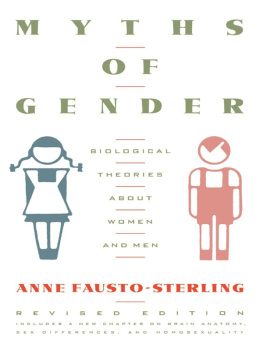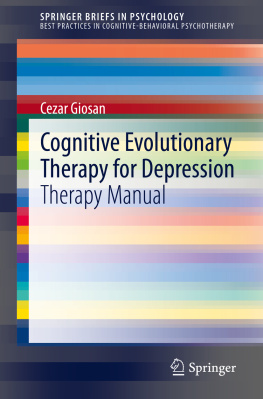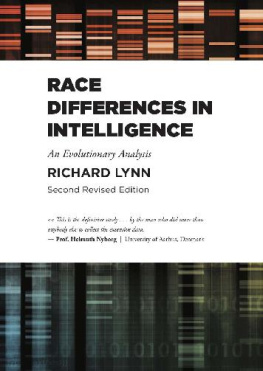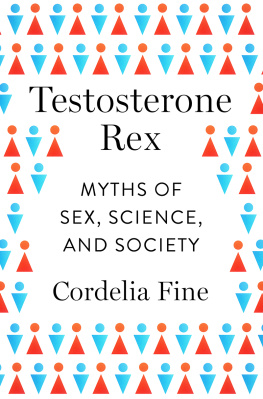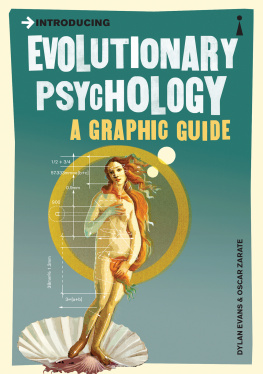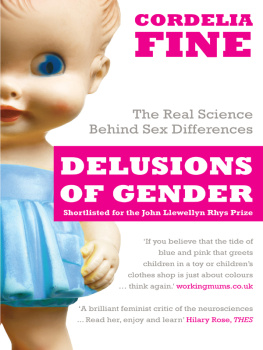Roderick Kaine - Smart and SeXy: The Evolutionary Origins and Biological Underpinnings of Cognitive Differences between the Sexes
Here you can read online Roderick Kaine - Smart and SeXy: The Evolutionary Origins and Biological Underpinnings of Cognitive Differences between the Sexes full text of the book (entire story) in english for free. Download pdf and epub, get meaning, cover and reviews about this ebook. City: London, year: 2016, publisher: Arktos Media Ltd., genre: Science. Description of the work, (preface) as well as reviews are available. Best literature library LitArk.com created for fans of good reading and offers a wide selection of genres:
Romance novel
Science fiction
Adventure
Detective
Science
History
Home and family
Prose
Art
Politics
Computer
Non-fiction
Religion
Business
Children
Humor
Choose a favorite category and find really read worthwhile books. Enjoy immersion in the world of imagination, feel the emotions of the characters or learn something new for yourself, make an fascinating discovery.
- Book:Smart and SeXy: The Evolutionary Origins and Biological Underpinnings of Cognitive Differences between the Sexes
- Author:
- Publisher:Arktos Media Ltd.
- Genre:
- Year:2016
- City:London
- Rating:3 / 5
- Favourites:Add to favourites
- Your mark:
- 60
- 1
- 2
- 3
- 4
- 5
Smart and SeXy: The Evolutionary Origins and Biological Underpinnings of Cognitive Differences between the Sexes: summary, description and annotation
We offer to read an annotation, description, summary or preface (depends on what the author of the book "Smart and SeXy: The Evolutionary Origins and Biological Underpinnings of Cognitive Differences between the Sexes" wrote himself). If you haven't found the necessary information about the book — write in the comments, we will try to find it.
Roderick Kaine: author's other books
Who wrote Smart and SeXy: The Evolutionary Origins and Biological Underpinnings of Cognitive Differences between the Sexes? Find out the surname, the name of the author of the book and a list of all author's works by series.
Smart and SeXy: The Evolutionary Origins and Biological Underpinnings of Cognitive Differences between the Sexes — read online for free the complete book (whole text) full work
Below is the text of the book, divided by pages. System saving the place of the last page read, allows you to conveniently read the book "Smart and SeXy: The Evolutionary Origins and Biological Underpinnings of Cognitive Differences between the Sexes" online for free, without having to search again every time where you left off. Put a bookmark, and you can go to the page where you finished reading at any time.
Font size:
Interval:
Bookmark:
Roderick Kaine
Smart and SeXy
The Evolutionary Origins and Biological Underpinnings of Cognitive Differences between the Sexes
Arktos
London 2016
Copyright 2016 by Arktos Media Ltd.
All rights reserved. No part of this book may be reproduced or utilised in any form or by any means (whether electronic or mechanical), including photocopying, recording or by any information storage and retrieval system, without permission in writing from the publisher.
ISBN
978-1-910524-74-9 (Softcover)
978-1-910524-75-6 (Ebook)
BIC
Sociology: sexual relations (JHBK5)
Psychology of gender (JMG)
Gender studies, gender groups (JFSJ)
Neurosciences (PSAN)
Genetics (non-medical) (PSAK)
EDITOR
Martin Locker
COVER DESIGN
Sean Lenahan
http://seanlenahansd.daportfolio.com/
SeanlenahanSD@gmail.com
LAYOUT
Tor Westman
Arktos Media Ltd.
www.arktos.com
Arktos on Facebook
More books from Arktos
About the Author
Roderick Kaine is an American who has a degree in biochemistry, and he has done professional research in both Biology and Neuroscience. After moving on from this work, he has focused on writing and independent scholarship. He has been active in the neoreactionary movement, where he writes under the name Atavisionary.
www.atavisionary.com
More Neoreactionary content:
www.reddit.com/r/darkenlightenment
Table of Contents
Disclaimer
Some of the views and opinions in this book are highly controversial. In no way is the intention of this book meant to insinuate that any of the scientists cited agree with any stated opinions. They may or may not; I do not know. The amount of direct communication had with any of the people cited has been minimal and for the large majority there was no direct communication whatsoever. When there was direct communication, the full scope or thesis of the book was not explained. Anyone who reads this book and becomes upset at its content should not presume to blame the academics whose research was discussed. They had no part in its writing and this work does not claim to represent their opinions in any way.
Introduction
I originally thought of the idea of X-linked inheritance as an explanation for achievement differences between men and women while an undergraduate taking a class on the genetic causes of mental illness. We were discussing the greater incidence of mental disabilities in males than in females when I suddenly had a spark of inspiration. I immediately raised my hand to ask the obvious question, Are there many genes expressed in the nervous system found on the X chromosome? The professor responded that it was a well-established fact in neuroscience that a large and inordinate number of nervous system genes map to the X chromosome. From there everything else fell into place. If the X chromosome possesses a relatively large number of recessive intelligence boosting alleles, as well as recessive intelligence lowering genes, then pseudo-dominance of the X in males could easily explain the greater variability in the male intelligence distribution. To my knowledge, no other biological characteristic can explain this pattern.
Having never been discussed in my previous three years studying biological sciences, including several courses on genetics, I wondered if I had really come up with something brand new. Why had I never heard of this before? In a somewhat nave fashion I went searching through the literature to see if I was really the first person to come up with this idea. Feeding my pride (and then suddenly stripping it away), a tiresomely long search eventually revealed some relevant papers, which then provided plenty of additional resources.
The very first reference to the idea appears to have been put forward by Dr. R. Lehrke in 1972 in a paper titled Theory of X-linkage of Major Intellectual Traits. He mainly based his hypothesis on the evidence of X-linked mental retardation and the overall greater incidence of cognitive disorders among males. The initial response to his idea was very hostile, understandably given the profound implication that various equality based political ideologies would be flatly refuted by it. As time wore on more evidence was accumulated and there was gradual acceptance in specific disciplines. There were occasional papers which appeared on the topic between 1972 and 2000, but most of the published work seems to have been released after the year 2000. This is not surprising considering it was the human genome project, completed in 2003, which first made direct wide-spread verification of the idea possible. Most of these relevant papers will be cited during the course of this book. At this point, there have even been a few news articles in lay-person, science oriented magazines.
Of course, in retrospect, the idea is quite simple and obvious, and has probably been independently conceived by many, many scientists working in neuroscience, biology, genetics, and perhaps even psychometrics. I say independently conceived because there is surprisingly little discussion of the idea outside of a few groups in a few select fields and absolutely nothing that would connect cognitive skills to X linkage in undergraduate education. This often leaves it up to the discerning scientist to realize it on his own; or hear it through the grapevine. Although one paper hints that it might be a frequent topic of quiet speculation among geneticists, I never personally found anyone besides myself discussing it in the biology labs that I worked in.
The dearth of discussion on this subject is likely caused by the tense political climate surrounding gender issues that can be expected to silence timid scientists worried about their careers. The result is that the idea is a tightly-held, open secret within specific disciplines of professional research and outside of education. Why should it be ignored or even suppressed? If intelligence really is X linked, it has widespread implications for whether or not gender equality at the highest levels of achievement is actually attainable in any real and meaningful sense. Specifically, it strongly implies that gender parity at the top levels of achievement is literally impossible because the underlying biology will not support nearly as large of a frequency of highly intelligent females as it does males. If that isnt a taboo conclusion, then nothing is. In this work, I set out to have no regard for taboo. The idea that biology causes the majority of gender differences in intelligence will be discussed without any concern for liberal sensibilities. Objective truths exist and those truths do not care about prevailing popular sentiments. They exist and will continue to exist regardless of how popular utopian visions of society become. Some people, maybe most, who read this are likely to become offended by what is suggested. Consider this the only so-called trigger warning. The faint of heart should turn back from these dark paths now.
The closest thing that science has (or should have) to something sacred is value placed on upholding truth and objectivity. In practice mistakes are made and sometimes objectivity is compromised, but the scientific community has a commitment to integrity that ensures progress towards uncompromised truth marches on, no matter how uncomfortable and inconvenient. Eventually mistakes and misunderstandings are corrected; though sometimes this process can take decades (see the recent reappraisal of the health risks of cholesterol).
At least that is the hope. Science, however, does not live in isolation. The tides of the wider world break upon the culture of the scientific community as much as any other. The politically motivated feminist movement in particular has had a profound effect on the interpretations made from research studies; most especially in psychology and sociology. Feminist ideology has also restricted the types of experiments that are allowed to be conducted in the first place, and has even more severely restricted what sorts of interpretations are tolerated for a given set of data. In the quest to determine what role biology plays in gender differences in intelligence, the feminist dog (to put it nicely) has a large bone in the fight. Should biology turn out to play a large role in such differences, the whole feminist house of cards must, by necessity, come tumbling down. Suppressing such findings has thus become an existential imperative for the feminist movement.
Font size:
Interval:
Bookmark:
Similar books «Smart and SeXy: The Evolutionary Origins and Biological Underpinnings of Cognitive Differences between the Sexes»
Look at similar books to Smart and SeXy: The Evolutionary Origins and Biological Underpinnings of Cognitive Differences between the Sexes. We have selected literature similar in name and meaning in the hope of providing readers with more options to find new, interesting, not yet read works.
Discussion, reviews of the book Smart and SeXy: The Evolutionary Origins and Biological Underpinnings of Cognitive Differences between the Sexes and just readers' own opinions. Leave your comments, write what you think about the work, its meaning or the main characters. Specify what exactly you liked and what you didn't like, and why you think so.




